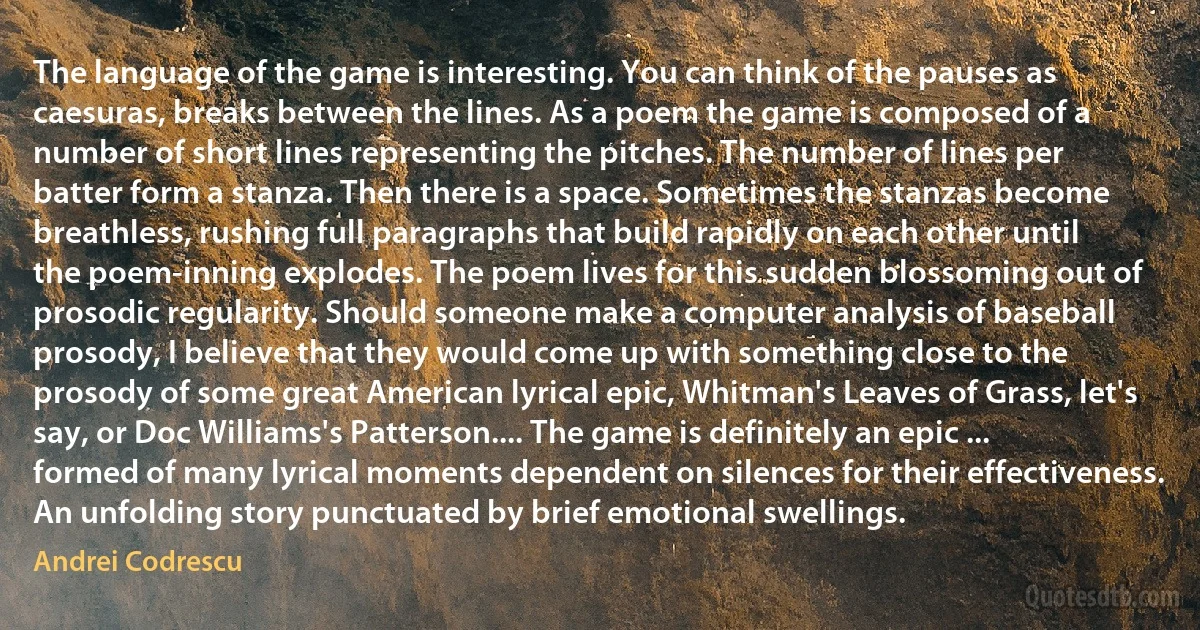
The language of the game is interesting. You can think of the pauses as caesuras, breaks between the lines. As a poem the game is composed of a number of short lines representing the pitches. The number of lines per batter form a stanza. Then there is a space. Sometimes the stanzas become breathless, rushing full paragraphs that build rapidly on each other until the poem-inning explodes. The poem lives for this sudden blossoming out of prosodic regularity. Should someone make a computer analysis of baseball prosody, I believe that they would come up with something close to the prosody of some great American lyrical epic, Whitman's Leaves of Grass, let's say, or Doc Williams's Patterson.... The game is definitely an epic ... formed of many lyrical moments dependent on silences for their effectiveness. An unfolding story punctuated by brief emotional swellings.
Andrei CodrescuRelated topics
baseball batter believe blossoming build close computer effectiveness emotional epic form full game grass great language leaves lives number say should short something space stanza story sudden think someone doc representingRelated quotes
Vampires can't exist. There'd be detailed records in the archives; they couldn't possibly evade detection by the state for any significant period. Besides which...there'd be corpses everywhere. Human blood is a poor nutrient source; it's about 60 percent plasma by volume and only provides about 900 calories per liter, so your hypothetical blood-sucking fiend is going to have to drink about two and a half liters per day. Those calories don't come in the form of useful stuff like glucose and fat: it's mostly protein from circulating red blood cells. Dracula would have to exsanguinate a victim every day just to stay alive, and would suffer from chronic ketoacidosis. The total number of intentional homicides for the whole country is around 700 a year; a single vampire would cause a 50 percent spike in the murder rate. Or they'd have to take transfusion-sized donations about two thousand times a year.

Charles Stross
I gave up on this stuff. I gave up on my species and ... I gave up on my countrymen. Because I think we squandered great gifts. I think humans were given great great gifts: walking upright, binocular vision, opposable thumb, large brain ... We grew. We had great gifts, and we gave it all up for both money and God ... We gave it all up to superstition, primitive superstition, primitive shit ... Invisible man in the sky, looking down, keeping track of what we do, make sure we don't do the wrong thing, if we do, he puts us in hell, where we burn forever. That kind of shit is very limiting for this brain we have. So we keep ourselves limited. And then we want a toy and a gizmo and gold and we want shiny things, and we want something to plug in that will make big big big things for us... And all that shit is nothing! It's nothing.

George Carlin
Leibnitz, the great mathematician, published his 'Protogaea' in 1680. He imagined this planet to have been originally a burning luminous mass, and that ever since its creation it has been undergoing gradual refrigeration. Nearly all the matter of the earth was at first encompassed by fire. When the outer crust had at length cooled down sufficiently to allow the vapors to be condensed, they fell and formed a universal ocean, investing the globe, and covering the loftiest mountains. Further consolidation produced rents, vacuities, and subterranean caverns, and the ocean, rushing in to fill them, was gradually lowered. The principal feature of this theory, the gradual diminution of the original heat, and of an ancient universal ocean, were adopted by Buffon and De Luc, and entered under different modifications, into a great number of succeeding systems.

Charles Lyell
I think its time to get motivated folks. I don't know what you're doing, but it's time to get really moving. We are rapidly running out of time. What do we do? Number one, you need to realize that God is in control. Don't get nervous, get busy, but don't get nervous. For he's the potter, we're the clay. Do what he says, simple. We should be as wise as serpents and harmless as doves. Be careful for nothing, full of care. Don't get nervous, just get busy. We should pray for those in authority. If you were praying for your senators, you would know their names, wouldn't you? We're God's children. It's our job to obey him. Preach the Gospel. We're suppose to be the salt of the earth. Salt does a lot of interesting things. Salt preserves; you should be a preserving force in your community. Salt irritates. If nobody is irritated with you, you aren't a good Christian.

Kent Hovind
In conclusion, it appears to me that nothing can be more improving to a young naturalist, than a journey in distant countries. It both sharpens, and partly likewise allays that want and craving, which, as Sir J. Herschel remarks, a man experiences although every corporeal sense is fully satisfied. The excitement from the novelty of objects, and the chance of success, stimulate him to increased activity. Moreover as a number of isolated facts soon become uninteresting, the habit of comparison leads to generalization. On the other hand, as the traveller stays but a short space of time in each place, his descriptions must generally consist of mere sketches, instead of detailed observation. Hence arises, as I have found to my cost, a constant tendency to fill up the wide gaps of knowledge, by inaccurate and superficial hypotheses.

Charles Darwin
